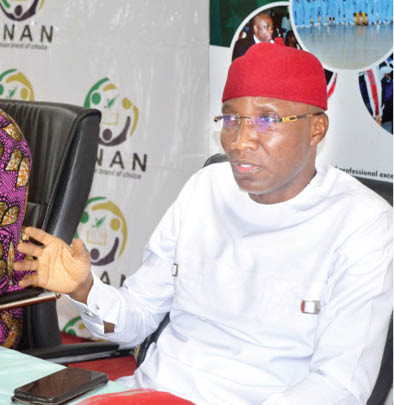The president/chairman of Council, Chartered Institute of Forensics and Certified Fraud Examiners of Nigeria (CIFCFEN), Dr Iliyasu Gashinbaki, has said a bill for the establishment of the institute, if passed into law, would aid anti-corruption efforts in Nigeria. He said this in this interview with Daily Trust on Sunday.
The Institute of Chartered Accountants of Nigeria (ICAN) opposed your bill during the House of Representatives’ public hearing. Does this in any way have to do with institutional rivalry?
I will not put it that way. The ICAN is a monopoly. From 1965 when it was created, it did not want the existence of the Association of National Accountants of Nigeria (ANAN).
- June 12: Peaceful protests, rallies rock states
- Real reasons we cut onion supply to South – Producers
The ANAN was founded in 1979, incorporated in 1983 and chartered through Decree 76 of 1993 by the General Ibrahim Babangida regime. Nigerians can now see within the past 42 years what the ANAN has achieved as an institution.
This has created a healthy competition as people have a choice. Now, the ANAN has gone ahead to create those institutions we have talked about: college, a university, and it is promoting the chartered institute.
There are other areas in Nigeria that show that having two or more bodies give you a better outcome. For example, if you remember clearly when we only had the West African Examinations Council (WAEC), you had a situation where you missed and had to wait till the following year until the National Examinations Council (NECO) came on board. We now have the two and you can even combine, and that has taken away that burden of restricting our young people from accessing higher education.
Beyond that, look at the Independent Corrupt Practices Commission (ICPC) and the Economic and Financial Crimes Commission (EFCC). These two bodies are very similar, but you can see that they are overburdened, overstretched and overwhelmed.
In addition to this is the fact that forensic accounting is just a component part of the gamut of the entire forensic sciences. It is not an accountant that will do signature, handwriting, identification of forgery and the rest.
Even the forensic accounting they do is a tiny component of forensic science because real forensic accounting is tied to computer science. So, if the accounting knowledge is not continually sufficient to do that, it is very clear that the monopolistic tendency is what they are holding on to.
If you watched the proceedings of the public hearing on Thursday, May 27, that is not the position from all the stakeholders. All of them were supporting the position of getting the bill passed. The ICAN was the only body that was talking about what is not even provided in the Act.
Some people say your institute is seeking to duplicate the functions of ant-corruption agencies; what do you say to that?
That is a huge misconception. The ICPC, EFCC, Nigeria Police Force, National Drug Law Enforcement Agency (NDLEA), other law enforcement agencies, anti-corruption agencies etc, were established, funded and controlled by the federal government. Our institute is self-regulated and self-funded to train professionals that will practise forensics in all ramifications and fraud examination. We are complementary and not in competition with them. We train investigators and it stops at that.
Specifically, what will this institute achieve if the bill for its establishment is passed into law?
This bill has two major branches. One is the forensic component, which is multidisciplinary. You have different components of forensics under that. The other layer is fraud examination, which is also multidisciplinary or sectoral.
Here, we are dealing with insurance fraud, capital market fraud, banking fraud and the entire ramifications of different manifestations of fraud. These two are now fused together. So, we are not just talking and forensics but also fraud examination.
Secondly, we are establishing the Nigerian Forensic Academy, which is going to be regional, such that the entire Africa will benefit from it. The other component is our support for institutional strengthening and capacity building for our law enforcement agencies.
The EFCC, ICPC and police are doing very well as at now. They can only get better with the institute on board. What we are saying is this: if the bill for this institute becomes law, we will help train and retrain these agencies in scientific investigation and prosecution.
The impact of that will be qualitative investigation, sound prosecution, and the conviction rate will go up. That is a direct impact that will be seen in our law enforcement agencies as a clear outcome you can’t contest.
From the National Assembly point of view, our lawmakers need to be trained and retrained to understand the issues of oversights, and of course, that is very critical as this will enhance the capacity of the legislators.
Then the judiciary: some of the challenges our law enforcement agencies are having in court is that our judges when it comes to forensic-related issues and fraud, they have limitations. So this body will also help in building their capacity. If you look at it, the judiciary, legislature and executive are all directly going to be beneficiaries of this. It cuts across all the tiers and arms of government.
What if this bill is not passed into law; is there any plan B?
The passage of this bill will be the greatest contribution to democracy and the anti-corruption fight of the present administration. The importance of this body to the three arms and tiers of government is so germane that we think the charter would perhaps be the greatest gift the 9th Assembly will give to this country.
So the contemplation of this bill not being passed is not even on the table because we believe that the 9th National Assembly would do the right thing here. We are also very happy that the stakeholders, even from the government side, support this bill and one monopolistic voice is not sufficient to alter what will deliver development to Nigerians. So there is no plan ‘B.’

 Join Daily Trust WhatsApp Community For Quick Access To News and Happenings Around You.
Join Daily Trust WhatsApp Community For Quick Access To News and Happenings Around You.

